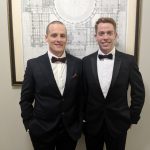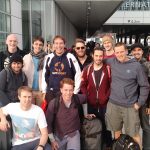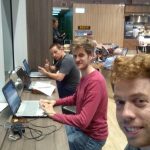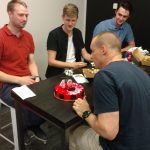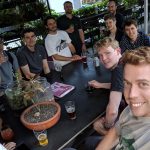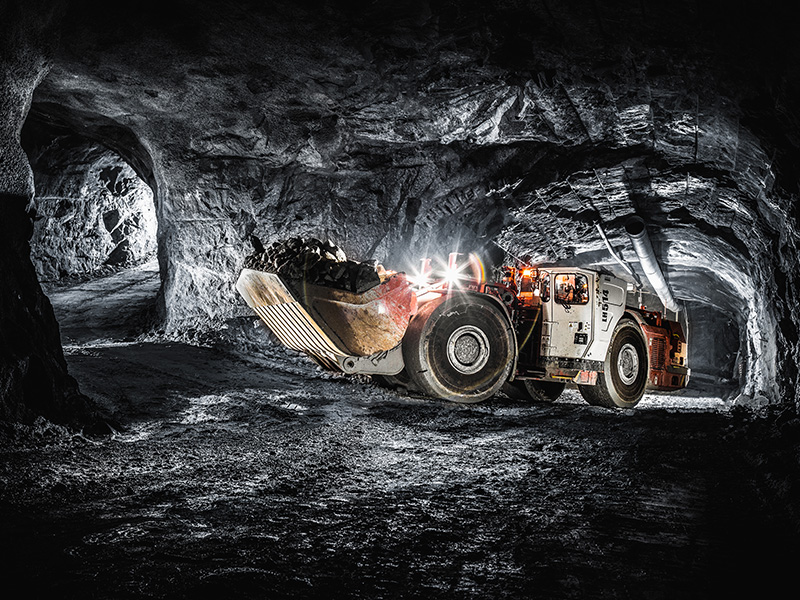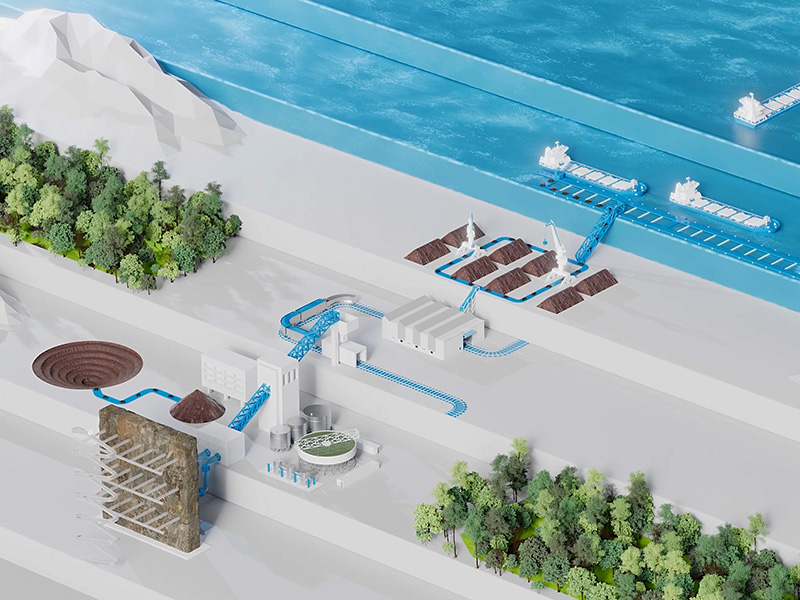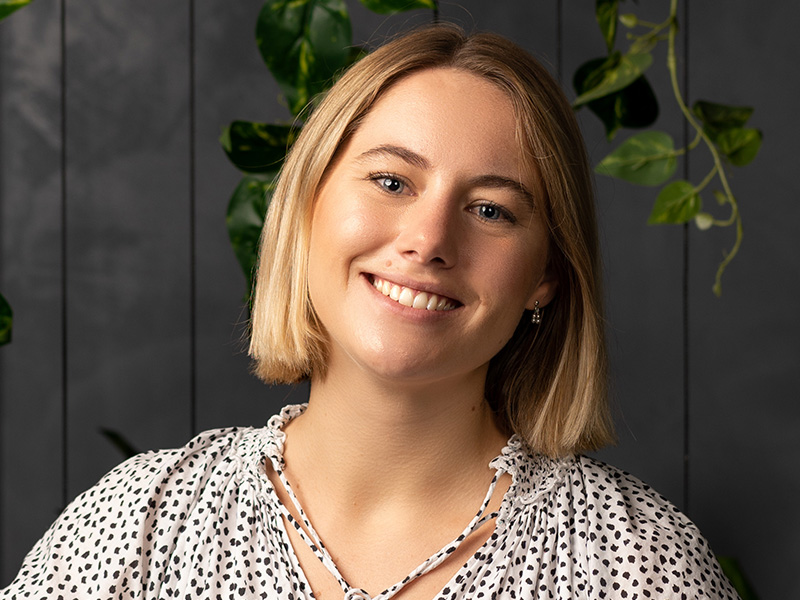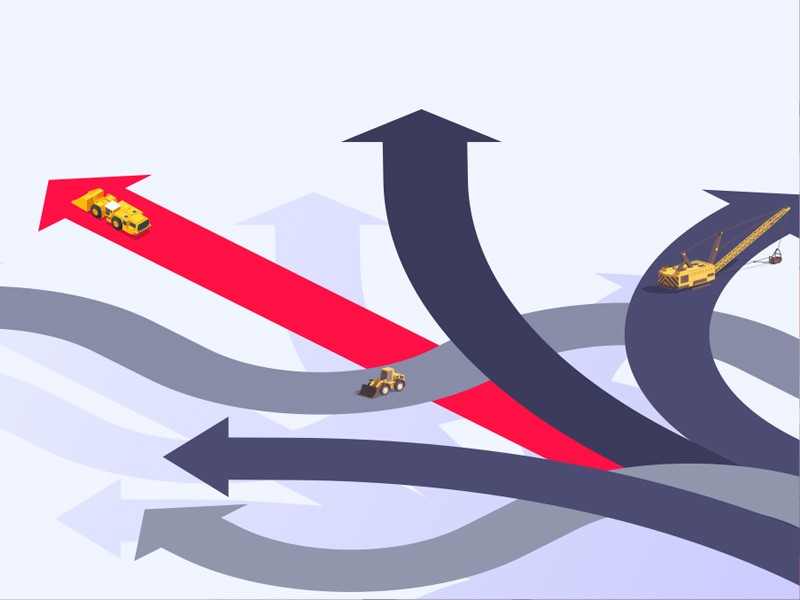Celebrating seven years with seven questions
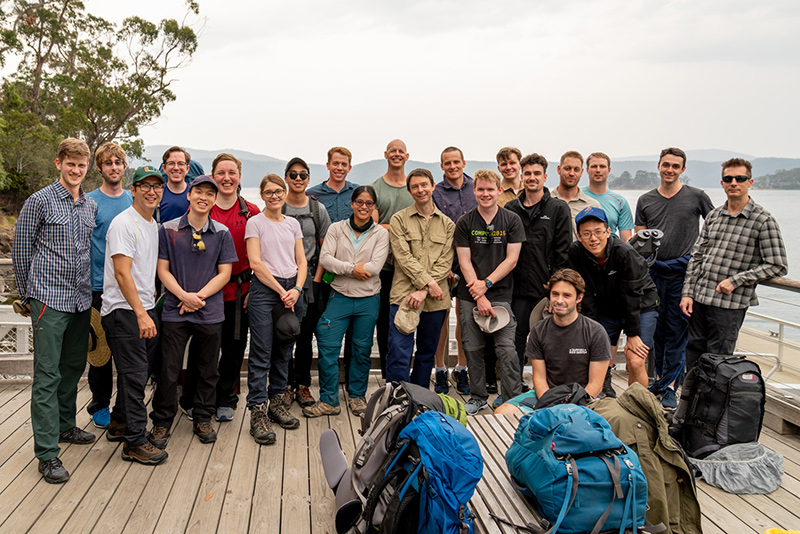
As we celebrate 7 years since Polymathian was formed, our co-founders celebrate not just the journey and the milestone, but the clients who have come to us with their problems, and the staff who have joined us and stayed to help craft the answers. Ben Hollis, Jonathon White and Steven Donaldson shared their thoughts about what has shaped Polymathian, answering 7 questions to succinctly sum up 7 years.
Question 1 - How did it all start?
Polymathian began with the three of us, Ben, Jonathon and Steven, working around a dining room table in a shared
house in Petrie Terrace with the goal to solve the world’s most complex mathematics problems. Between us, we had
belief, technical know-how and visibility of market opportunity and a desire to make a go of it.
From previous work experience we’d seen there was growing opportunity to use Industrial Mathematics in a wide range
of industries to deliver value, but there was a big barrier to entry for a lot of people in the IT systems required
to support that technology. We saw the initial opportunity was to focus on creating a platform which would allow us
to very quickly jump over those IT hurdles and be able to focus on delivering the value of Industrial Mathematics
solutions, which lead to Tropofy and is the engine behind our entire product range today.
Question 2 - What has changed about how, where, or why you work over the 7 years?
The appetite for the services we offer is growing at an accelerated rate as multi-billion dollar companies seek to
increase the sophistication of their processes and to dramatically improve efficiencies. Senior managers in any of
these heavy industries are realising “there has to be a better way” to do things.
We’ve been very good at solving novel problems that either haven’t been solved before or needed a refresh due to old
technology. In the earlier days, we just solved custom problems but over time we solved the same problems over and
over again which enabled us to productise our solutions for more rapid deployments. Through word of mouth referral
and repeat work, we found a specialty in mining and heavy industry over the last seven years and we do a lot of work
in these areas today.
Over time we have built up a reputation which has allowed us to grow from an east-coast Australia customer-base to
taking on more and more national and international projects.
Question 3 - At what point did you realise this was going to work?
Very early on we got a phone call from someone we knew who worked for a mining company who asked if we could solve a
particular business problem for them. Their expectation was a meeting to discuss what they could do better, but the
next day we sent them a login for a tool that solved this problem. At that point in our history, we had spent about
6 months writing the core technology we knew would be the key to Polymathian’s success, Tropofy, and it was almost
ready so when we got that phone call we tested it and were able to use that technology to win work. We are still
working with that client today. This experience went a long way to building our most successful product, BOLT. Once
you understand how a problem needs to be solved and you have the technical capability to solve it, you can
demonstrate value in order to win more
work.
We always thought it was going to work, maybe in the beginning we were a little blindly optimistic, but now, having
validated our belief in what we are doing, we all have tremendous confidence in the future. In the early days
winning our first client was a huge challenge and meant many late nights and plenty of hard work, nowadays people
are coming to us after hearing of other work we have done.
Question 4 - What has been the biggest challenge you’ve had to overcome?
Earlier on, we worked hard to build a reputation and get in front of the right people to win work. More recently,
the biggest ongoing challenge is making sure we are continually providing opportunities for staff and an environment
where they want to keep coming to work. With plenty of opportunity out there, we recognise the importance of growing
in a smart and sustainable way.
Question 5 - What has been the winning combination in building the Polymathian team?
Because of our own technical backgrounds we have been fortunate to be able to identify and recruit incredibly
talented people. In the earlier years we needed “unicorns” – people who have a varied mix of skills blended into one
person – people great at software development/configuration who could handle consultancy and solve hard math
problems.
As we get larger it is easier to hire for more specific roles in the company, but we continue to be pretty selective
with who we hire because we recognise that our people are the key to our success. As a result, we promote from
within, give our staff autonomy, and continue to learn from them. We consider it one of our greatest achievements
that the overwhelming majority of staff we have hired in the years since we started are still working with us today.
This is the key ingredient to why we are doing well and will continue to do so well into the future.
Question 6 - Is there any milestone or achievement thus far that stands out as a highlight?
Early on, there were three key customers, all from different industries, who took a risk by asking us to build an
optimisation-based piece of software for them, and as a result of each of those customers making those decisions, we
have been able to create three of our most successful products today. We mentioned one of those customers earlier,
the one who called us and asked us to solve a problem that resulted in us deploying a tool the next day, we
recognise that opened a lot of doors for us, that client was Rio Tinto.
Question 7 - What will the 10th birthday bring? And the 20th?
The objective has always been to be the premier provider of Industrial Mathematics solutions, to educate industry
about what that means, and help businesses develop an understanding about the potential value it delivers. In the
shorter term we plan to open more Australian offices and continue to develop the existing products in our portfolio,
as there is so much more they can offer.
As we look further ahead, we believe the market will increase its appetite, and therefore drive demand, for more
sophisticated optimisation-based software that can be used in the real-time space - and that’s a good thing. We
already have two products with truly autonomous, real-time modules capable of running continuous optimisation. The
technology exists to build and deploy these tools that no longer produce just theoretical results, but solutions
that will be enacted within the next few seconds. When you can build tools with that level of capability, you are
effectively running a sophisticated part of that company and therefore making that part more efficient and/or
profitable, which is very exciting.
Only seven years in, we are being consistently referred new work within our core business areas, but as we grow and
expand and have the opportunity to demonstrate the value we can bring to other industries, we can adapt and
diversify our product offerings to establish ourselves within industries we are not yet well-known in around the
world.
Our founders are all very technical people, born in technical roles solving complex problems. It has been a
challenge for all of us to take a step back and manage things, it’s something different to what we have been trained
to do, but we see that the things we imagined for Polymathian are being realised and we continue to believe in what
we do. Fundamental to the years ahead will be to continue evolving, always, and to accept that as normal, and to
continue loving what we do.


